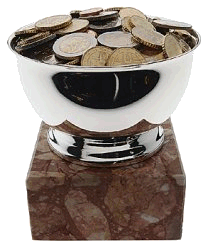Should You Invest in Gold and Silver?
by www.SixWise.com
Gold and silver have a reputation for being a stable, safe
bet when it comes to investing, particularly amid huge U.S.
deficits and the decreasing value of the U.S. dollar. But
is investing in gold, silver and other precious metals really
a good idea?
|

Investing in gold bullion has its aesthetic appeal,
but have you considered where to store it?
|
It depends. Gold, silver and other precious metals offer
a sense of security, an insurance policy, if you will, that
you will have something to fall back on if the economy crashes.
If the economy is doing OK, precious metals can still be a
fairly wise investment strategy, but that's not to say it's
without risk. Precious metals are known for being volatile
and quite unpredictable.
Because of this, experts say you shouldn't tie up more than
5 percent (and certainly not more than 10 percent) of your
investment money in precious metals, and you should get to
know the various ways you can invest in this specialized market.
Most Common Ways to Invest in Precious Metals
Gold Bullion: Gold bullion (or bars) is pure (or almost pure)
gold. You can purchase these at banks, brokerage houses and
precious metals dealers, and revel in the decadence of owning
gold bars. However, you should always buy from a reputable
source and have the metal certified for weight and purity
so you don't get taken. Meanwhile, when you buy gold bullion
you must also have a very safe place to store it (and recognize
that you won't earn interest on it). You can also buy silver
bullion, platinum bullion and palladium bullion.
Numismatics: Numismatics are minted coins (in a variety of
precious metals, but most commonly silver or gold) that were
usually created to commemorate a special occasion. You should
shop around for these coins, as mark-up will vary, as will
the value of the coins depending on design and condition.
Certificates: You can buy certificates that represent your
ownership of a specified quantity of gold, silver or platinum.
These allow you to own precious metals without having to worry
about storing the actual product.
|

Before investing in numismatics, be sure you are familiar
with the market. The value of coins can vary widely
depending on variety and condition.
|
Stocks and Mutual Funds: A relatively simple and safe way
to invest in the precious metals market is with mutual
funds, which are diversified and managed for you. Precious
metals stocks are also available, but, because they are less
diversified, are a bit more risky.
Futures: Futures are a contract to buy or sell precious metals
for a certain price at a future point in time. While this
has the potential for a large return, it is also extremely
risky. Experts typically only recommend investing in precious
metals futures if you are very familiar with the metals market
(and are confident that you will be able to accurately predict
whether values will rise or fall).
If you opt to invest in precious metals, remember that it
should be looked at as a medium- to long-term investment that
is primarily geared toward diversifying your portfolio.
What to Watch Out For
The safest way to invest in precious metals is with shares
of a mutual fund. It will be managed for you and provides
instant diversification. If you decide to buy bullion or certificates,
however, be wary of high-pressure, get-rich-quick claims.
According to the United States Commodity Futures Trading
Commission (CFTC), some companies that advertise on radio,
television or Web sites, or make telephone "cold calls"
to encourage you to purchase precious metals may sometimes:
-
Overstate their ability to predict prices
-
Minimize the degree of investment risk
-
Charge phony storage and interest fees
Investing in precious metals can be a good long-term choice,
just be wary and watch out for the following scam warning
signs:
-
Companies that guarantee large profits with little risk
-
High-pressure tactics to send cash immediately
-
Unsolicited phone calls from companies you aren't familiar
with
Prior to purchasing, if you are unsure about a company's
credibility you can contact CFTC www.cftc.gov,
your state's securities commissioner www.nasaa.org,
and the National Futures Association www.nfa.futures.org
to check them out.
Recommended Reading
Mutual
Funds: The Basics (That Most People Still Don't Know)
401(k)s:
8 Key Tactics You Need to Know to Get Full Benefit from Your
401(k)
Sources
The
United States Commodity Futures Trading Commission (CFTC)
ehow.com